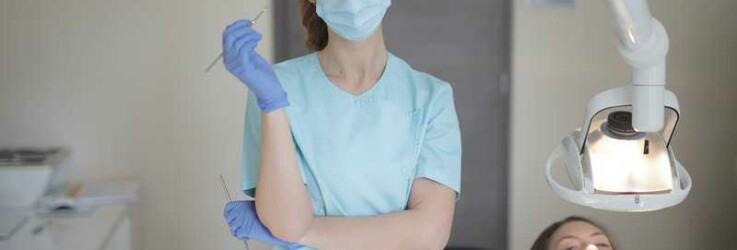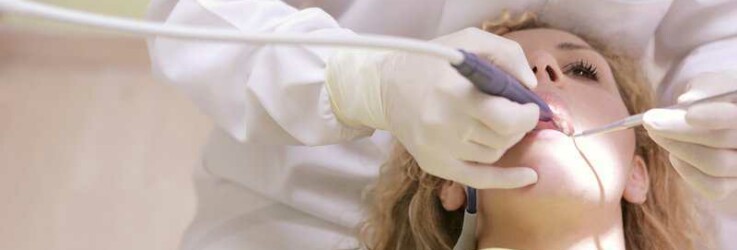What Does The Hygienist Do When They Clean Your Teeth?

Visiting your dentist in Douglasville for a routine teeth cleaning might seem like a straightforward procedure, but behind the scenes, dental hygienists work diligently to ensure your oral health is in top-notch condition. But what exactly does the hygienist do when they clean your teeth?
The Pre-Cleaning Assessment
Before the cleaning begins, your dental hygienist performs a thorough assessment of your oral health. This includes reviewing your medical history, checking for any changes in your overall health that may impact your dental treatment or oral health, and discussing any concerns or issues you might be experiencing.
Once the assessment is complete, your hygienist will start examining your teeth and gums. They use specialized tools and mirrors to identify areas of concern such as plaque buildup, tartar deposits, and signs of potential gum disease. This initial evaluation serves as the foundation for developing a personalized cleaning plan tailored to your specific needs.
Plaque and Tartar Removal
One of the primary tasks of a dental hygienist during a teeth cleaning is the removal of plaque and tartar. Plaque, a sticky film of bacteria, accumulates on teeth surfaces and, if not adequately removed, can lead to cavities and gum disease. You can reduce plaque buildup by regularly brushing and flossing at home. Tartar, however, is a hardened form of plaque and needs to be removed by a hygienist.
To address these issues, dental hygienists use tools like scalers to gently and carefully scrape away plaque and tartar from the surfaces of your teeth. They’ll pay particular attention to areas that may be more prone to buildup such as the gumline and between teeth. This meticulous process helps prevent the progression of dental problems and promotes optimal oral health.
Polishing for a Gleaming Smile
After the removal of plaque and tartar, your dental hygienist takes the extra step of polishing your teeth. This not only enhances the aesthetic appeal of your smile but also serves a functional purpose. Polishing helps smooth out the tooth surfaces, making it more difficult for plaque to adhere and accumulate in the future.
A specialized dental polishing tool, coupled with a mildly abrasive polishing paste, is used to gently buff away surface stains and irregularities. This leaves your teeth feeling smooth and looking radiant, contributing to an overall refreshed and clean sensation.
Education and Oral Care Guidance
Beyond the physical cleaning process, dental hygienists play a crucial role in patient education. They take the time to provide valuable information on proper oral hygiene practices, including effective brushing and flossing techniques. They may also offer insights into dietary habits that can impact oral health and recommend specific oral care products tailored to your needs.
During this educational phase, dental hygienists empower patients to take an active role in maintaining their oral health between dental visits. Whether it’s emphasizing the importance of regular flossing or suggesting the use of certain products, these insights contribute to the prevention of dental issues and the longevity of a healthy smile.
In the realm of oral health, dental hygienists serve as unsung heroes, meticulously working to keep your teeth and gums in optimal condition. The process of teeth cleaning involves a combination of assessment, plaque and tartar removal, polishing, and patient education. The expertise and care provided by dental hygienists not only contribute to a sparkling smile but also play a vital role in preventing future dental problems. So, the next time you sit back in the dental chair for a cleaning, appreciate the intricate artistry involved in maintaining your oral health.
If it’s been longer than six months since your last dental cleaning, schedule an appointment with a dentist in Douglasville near you.
17
Feb
The Heart-Tooth Connection: Understanding the Impact of Oral Health on Heart Health

The Heart-Tooth Connection: Understanding the Impact of Oral Health on Heart Health
February is not just the month of love; it’s also Heart Health Month, a time when we focus on maintaining cardiovascular well-being. While we often associate heart health with factors like diet and exercise, one crucial aspect often overlooked is oral health. Surprisingly, the health of your teeth and gums can significantly impact the health of your heart, which is where your dentist in Douglasville steps in.
The mouth is a gateway to the body, and maintaining good oral hygiene is not just about a dazzling smile. In fact, research has shown a clear connection between poor oral health and an increased risk of cardiovascular diseases. Let’s explore the intricate relationship between oral health and heart health to understand why taking care of your teeth may be a crucial step in safeguarding your heart.
Gum Disease & Heart Health
One of the primary links between oral health and heart health lies in the prevalence of gum disease, also known as periodontal disease. This condition is characterized by inflammation and infection of the gums, leading to the gradual destruction of the supporting structures around the teeth. The bacteria responsible for gum disease can enter the bloodstream, triggering an inflammatory response that can affect the cardiovascular system.
Numerous studies have demonstrated a correlation between periodontal disease and an elevated risk of heart disease. The inflammation caused by gum disease can contribute to the development of atherosclerosis, a condition where fatty deposits build up in the arteries, restricting blood flow to the heart. This sets the stage for conditions like coronary artery disease, heart attacks, and other cardiovascular issues.
Moreover, the bacteria from the mouth can also directly infect the heart valves, a condition known as infective endocarditis. While this is a rare occurrence, it underscores the potential severity of the relationship between oral health and heart health. Individuals with pre-existing heart conditions or compromised immune systems are particularly vulnerable to such complications.
The Importance of Good Oral Health Habits
Beyond the direct impact of gum disease, poor oral health habits can exacerbate existing cardiovascular issues. Chronic inflammation, a common consequence of neglected oral hygiene, is a key factor in the development and progression of heart diseases. The body’s inflammatory response triggered by oral bacteria can contribute to systemic inflammation, amplifying the risk of cardiovascular problems. So, what can be done to maintain good oral health and reduce the risk to the heart?
- Brush your teeth at least twice a day and floss daily. These simple habits can significantly reduce the buildup of plaque and bacteria in the mouth, mitigating the risk of gum disease.
- See your dentist in Douglasville regularly. Regular dental check-ups are equally crucial. Professional cleanings and examinations can catch oral health issues in their early stages, preventing the progression of conditions like gum disease.
- Follow a heart-healthy lifestyle. Eating a balanced diet rich in fruits, vegetables, and whole grains not only benefits the heart but also supports good oral health. Limiting sugary foods and beverages is particularly important, as they can contribute to the development of cavities and gum disease.
As we observe Heart Health Month this February, let’s not overlook the vital role that oral health plays in maintaining overall cardiovascular well-being. By prioritizing regular dental care, adopting healthy oral hygiene habits, and making heart-healthy lifestyle choices, we can take significant steps toward ensuring a strong and resilient connection between our hearts and teeth. After all, a healthy smile may just be the key to a happy and hearty life.
What Does a Cavity Look Like?

Taking care of your oral health is essential to maintaining a healthy, radiant smile. As your trusted Douglasville dentist, we understand the curiosity, and often confusion, that surrounds oral health. One of the most common ailments and areas of question revolves around cavities. What causes them? How can you tell if you have one? What’s involved in treating a cavity? Let’s find out.
What Does a Cavity Look Like?
Your dentist in Douglasville believes in empowering patients with knowledge about their oral health. One common question we encounter is, “What does a cavity look like?” Some of the noticeable signs of a cavity include:
- A hole or damaged area on the surface of a tooth
- Discoloration such as dark spots, ranging from light brown to black
- Tooth sensitivity, especially when eating or drinking something hot or cold
- Pain when chewing
- Persistent bad breath
If you notice any of these signs, schedule an appointment with a dentist near you as soon as possible.
How Do Cavities Develop?
Cavities, also known as dental caries, are caused by the accumulation of plaque – a sticky film of bacteria – on the teeth. When sugars and carbohydrates in the food we consume interact with these bacteria, acid is produced. Over time, this acid erodes the enamel, creating a cavity.
The Importance of Early Detection and Prevention
Early detection of cavities is key to preventing further damage and maintaining optimal oral health. Regular dental check-ups and cleanings are your first line of defense against cavities. During your dental visit, your dental team will conduct a comprehensive examination, using advanced diagnostic tools to identify cavities early on, before they have a chance to cause more serious problems. Digital X-rays and visual inspections allow them to assess the extent of decay and formulate a custom treatment plan if needed.
How Are Cavities Treated?
Cavities are commonly treated through a quick dental procedure. Your dentist begins by numbing the affected area with a local anesthetic to ensure a painless experience. Using a drill or laser, the decayed portion of the tooth is carefully removed, leaving a clean and prepared surface. Once the decay is removed, your dentist fills the cavity with a suitable material such as dental amalgam or composite resin. This filling restores the tooth’s structure and prevents further decay. In more advanced cases, a crown may be placed to strengthen the tooth.
How to Prevent Cavities?
Maintaining a diligent oral hygiene routine is crucial to preventing cavities. Brushing teeth twice daily helps remove plaque and bacteria, reducing the risk of decay. Flossing daily is equally important, as it removes debris between teeth that a toothbrush might miss. Limiting sugary and acidic foods and drinks can also protect teeth, as these substances contribute to enamel erosion. Instead, choose a well-balanced diet rich in calcium and phosphorus to help strengthen teeth and prevent cavities. Additionally, regular dental check-ups with your Douglasville dentist, ideally every six months, allow for professional cleaning and early detection of potential issues.
If you haven’t seen a dentist in more than six months, we welcome you to schedule an appointment and take the first step towards a cavity-free future. Your radiant smile awaits!
A Guide to Reducing Sugar Intake During the Holidays

The holiday season is a time of joy, family gatherings, and, let’s face it, indulging in delicious treats. While it’s perfectly normal to enjoy some festive sweets, it’s essential to be mindful of the impact excessive sugar can have on oral health. Your dentist in Douglasville knows that the holidays can be a challenging time for our teeth, with an increased risk of cavities and other dental issues. However, with a few thoughtful strategies, patients can learn how to enjoy the season while still protecting their smiles.
- Plan Healthy Alternatives
Prepare for the holiday season by having a variety of healthy snacks readily available. Instead of sugary candies and chocolates, offer fresh fruit platters, vegetable sticks with hummus, or cheese and whole-grain crackers. Healthy alternatives can be just as festive and satisfying, ensuring that you have nutritious options within arm’s reach.
- Be Mindful of Sugary Beverages
It’s not just the candies and desserts that contribute to increased sugar intake during the holidays; sugary beverages play a significant role as well. Instead of sugary sodas or fruit juices, opt for water instead. If you want to add a festive touch, infuse water with fruit slices or serve it in holiday-themed cups.
- Practice Moderation
Rather than imposing strict bans on sweets, focus on moderation instead. Allow yourself to enjoy a small treat occasionally, just don’t overdo it. Moderation helps reduce sugar intake which can protect oral health.
- Create Healthy Traditions
Transform holiday traditions into opportunities for healthy choices. Instead of a cookie decorating marathon, consider making a variety of fruit skewers or assembling yogurt parfaits together. Engaging in these activities can be just as enjoyable, and it promotes a positive association between the holidays and nutritious food.
- Prioritize Oral Hygiene
During the holidays, maintain a consistent oral hygiene routine to counterbalance any indulgences. Brush their teeth after consuming sugary treats or rinse your mouth out with water. Also, make sure to floss every day to remove any lingering food particles that could contribute to cavity formation.
- Schedule a Post-Holiday Dental Checkup
Consider scheduling a dental checkup with your dentist in Douglasville after the holidays. This proactive approach allows any potential dental issues to be identified and addressed early on. Regular dental visits are crucial for maintaining optimal oral health and preventing more significant problems down the road.
Reducing sugar intake during the holidays is about fostering a balanced approach to festive celebrations. By offering healthy alternatives, being mindful of sugary beverages, practicing moderation, creating healthy traditions, prioritizing oral hygiene, and scheduling post-holiday dental checkups, patients can ensure that they enjoy the season with smiles that remain bright and healthy well into the new year.
4 Oral Health Things To Keep In Mind As We Age

As we journey through life, we all hope to maintain our radiant smiles and strong teeth. But the reality is that oral health can change as we age, and more often than not, we need extra support from our trusted dentist in Douglasville to keep our smiles in tip-top shape. So let’s explore some essential considerations for maintaining your oral health as you age, helping you make the most of your dental visits while safeguarding your overall well-being.
- Gum Disease: A Common Concern for Seniors
One of the critical issues to keep in mind as we age is the increased prevalence of gum disease among seniors. Gum disease, also known as periodontal disease, is a bacterial infection that can lead to severe health complications. It starts with inflammation in the gums and can progress to affect various parts of your mouth and face. In some cases, the infection may even spread to other tissues or organs, triggering additional health problems. The elderly are at a higher risk for gum disease due to several factors.
First, as we age, our immune systems tend to weaken, making it more challenging to fight off infections, including gum disease. Second, seniors may be less diligent in their oral hygiene habits, which can contribute to the development of gum disease. To mitigate these risks, it’s crucial for elderly family members and friends to schedule regular dental appointments with their dentist in Douglasville. Visiting the dentist twice a year for a thorough cleaning and examination can help detect and address any signs of gum disease early, preventing more severe complications down the road.
- Increased Risk of Tooth and Jaw Fractures
Aging is often accompanied by a decline in bone density, making seniors more susceptible to fractures, not only in their arms, legs, and hips but also in their teeth and jaws. This is a particularly important consideration as tooth and jaw fractures can have serious consequences. For many seniors, tooth loss is a common occurrence, often due to the shrinking of jawbones and other factors. When seniors are unable to bite correctly and don’t wear dentures as prescribed, their risk of experiencing a fracture increases significantly.
Fractures in the teeth or jaw can expose the affected areas to harmful bacteria, potentially leading to infections. These infections can spread rapidly and put pressure on nearby nerves, resulting in excruciating pain and discomfort. For seniors, this type of infection is especially risky as their immune systems may already be compromised by other age-related conditions, such as diabetes or heart disease. To reduce the risk of tooth and jaw fractures, it’s vital for seniors to consult their dentist for regular checkups and guidance on maintaining healthy teeth and jaws.
- The Link Between Oral Health and Whole-Body Health
It’s a common misconception that oral health is entirely unrelated to overall health. However, research suggests that the two are interconnected, with evidence pointing to a potential link between gum disease and systemic health issues. Studies have shown that gum disease may be associated with atherosclerosis in large arteries, increasing the risk of cardiovascular events such as heart attacks and strokes. This underscores the importance of regular dental checkups for seniors, as these visits can help monitor teeth for signs of decay or gum disease.
Without regular dental checkups, gum disease can progress silently, causing irreversible damage. Early detection and treatment are essential to prevent tooth loss and other dental or whole-body complications. Therefore, visiting your dentist in Douglasville at least twice a year becomes even more important, as it can help ensure your oral health is closely monitored and any issues are addressed promptly.
- The Impact of Missing Teeth on Overall Health
While not every senior will lose their teeth, it’s a relatively common occurrence. In fact, statistics show that among people aged 65 and older, 51 percent of men and 66 percent of women have lost all of their teeth. The absence of teeth can have far-reaching implications on both oral and overall health.
Seniors who are missing teeth often experience a diminished sense of taste, which can affect their enjoyment of food. Additionally, they face an increased risk of pneumonia, as the absence of teeth may make it more challenging to manage saliva and prevent aspiration of bacteria into the lungs. Furthermore, seniors with missing teeth are at a greater risk of choking on solid foods. To mitigate these concerns, there are solutions available, such as dentures, dental implants, and implant-retained dentures, which can help replace missing teeth and support overall health.
As we age, our oral health may require more attention and care. Regular dental visits with your dentist are essential for maintaining a healthy smile and safeguarding your overall well-being. By addressing issues like gum disease, the risk of tooth and jaw fractures, and missing teeth early, you can enjoy a vibrant smile and a healthier, more comfortable life as you age. Remember, oral health is intrinsically linked to your overall health, and nurturing both is key to a fulfilling and vibrant life in your golden years.
How to Go to the Dentist If You’re Scared

Dental anxiety is a common fear that many people experience. The mere thought of sitting in that dental chair can send shivers down your spine, making it a daunting task to schedule that long-overdue appointment with your dentist in Douglasville. However, taking care of your oral health is essential for overall well-being. The good news is that there are several strategies to help you overcome your fear and make that dental visit a much less terrifying experience.
Choose the Right Dentist
The first step in conquering your dental anxiety is finding a dentist who understands your fear and is willing to work with you. Look for a Douglasville dentist who specializes in treating anxious patients or one who has a reputation for being gentle and compassionate. Don’t be afraid to call and ask questions about their approach to patient care. A dentist who takes the time to listen to your concerns and discuss your fears will help ease your anxiety.
Communicate Your Fear
Open and honest communication with your dentist is key. Let them know about your dental fear before your appointment. This will allow them to adjust their approach and take extra steps to make you feel comfortable. Many dentists are experienced in dealing with anxious patients and can offer solutions like nitrous oxide (laughing gas) or oral sedation to help you relax during the appointment.
Bring a Support System
Having a trusted friend or family member accompany you to your dental appointment can provide emotional support and comfort. They can hold your hand, distract you with conversation, or simply be there to reassure you throughout the process. Knowing that someone you trust is by your side can significantly reduce anxiety.
Schedule Morning Appointments
If you’re anxious about your dental visit, consider scheduling your appointment for the morning. This way, you won’t spend the entire day worrying about it, and you can get over it early. Additionally, morning appointments are less likely to be delayed, reducing the time you spend in the waiting room, which can add to your anxiety
Practice Relaxation Techniques
Before heading to the dentist, practice relaxation techniques that can help calm your nerves. Deep breathing exercises, meditation, or even listening to soothing music can be effective ways to reduce anxiety. Bringing headphones and your favorite playlist to the dentist’s office can help create a more relaxed atmosphere during your appointment.
Explore Dental Sedation Options
For severe dental anxiety, dental sedation may be a viable option. Your dentist in Douglasville can discuss various sedation methods, including oral sedatives, intravenous (IV) sedation, or general anesthesia, depending on your needs and the complexity of the procedure. Sedation can make your dental visit virtually painless and anxiety-free.
Reward Yourself
After your dental appointment, reward yourself for facing your fears and taking care of your oral health. Treat yourself to something enjoyable, whether it’s a favorite meal, a new book, or some pampering. Associating positive experiences with dental visits can help reduce future anxiety.
Remember that dental anxiety is common, and many people share your fear. Dentists are trained to provide care for anxious patients, and there are numerous techniques and options available to make your dental visits more comfortable. By taking proactive steps and seeking the right support, you can conquer your dental anxiety and maintain a healthy, beautiful smile for years to come. Don’t let fear hold you back from taking care of your oral health; your teeth will thank you for it!
Good Dental Habits May Reduce the Risk of Breast Cancer

October is Breast Cancer Awareness Month, and when most people think about reducing the risk of breast cancer, they think about maintaining a healthy diet, regular exercise, and routine breast examinations. However, your dentist in Douglasville has some news about how taking care of your teeth may reduce the risk of breast cancer. In fact, recent research has suggested a strong link between oral health and breast cancer risk.
How Can Oral Health Affect Overall Health?
There’s a concept called the oral-systemic connection that has gained significant attention in the medical field in recent years. It refers to the intricate and interesting relationship between oral health and the overall health of the body. It’s no longer a secret that poor oral health can contribute to various whole-health issues, including heart disease, diabetes, and respiratory problems. Now, emerging research is shedding light on the connection between oral health and breast cancer.
The Link Between Gum Disease and Breast Cancer
One of the most compelling pieces of evidence linking oral health to breast cancer risk is the association between gum disease (periodontal disease) and breast cancer. Multiple studies have indicated that women with gum disease have a higher risk of developing breast cancer than those with healthy gums.
Researchers believe that the inflammation caused by gum disease may be a significant contributing factor. Chronic inflammation is known to play a crucial role in the development and progression of various cancers, including breast cancer. When the gums are infected and inflamed, the body’s immune response is activated, releasing inflammatory molecules into the bloodstream. These molecules can potentially reach breast tissue and promote the growth of cancer cells.
The Role of Oral Bacteria
Another intriguing aspect of the oral-breast cancer connection involves the role of specific oral bacteria. Some studies have identified certain types of bacteria that are more prevalent in the mouths of women with breast cancer. These bacteria produce enzymes that can modify estrogen, a hormone associated with breast cancer development.
Maintaining Good Dental Habits
Maintaining good dental habits is wise for various reasons, but knowing that it may help reduce the risk of breast cancer makes it crucial. Make sure you’re:
- Brushing and Flossing
Brushing your teeth twice a day and flossing daily can help keep your gums healthy and reduce the risk of gum disease and therefore the risk of cancers, including breast cancer.
- Limiting Sugar Intake
Sugary foods and drinks can contribute to tooth decay and gum disease. Reducing sugar consumption can improve your oral health and overall health.
- Quitting Smoking
Smoking is a significant risk factor for gum disease and various cancers, including breast cancer. Quitting smoking is a crucial step in improving both your oral and overall health.
- Eating a Balanced Diet
A diet rich in fruits, vegetables, and whole grains provides essential nutrients for gum health. Additionally, antioxidants found in these foods may help reduce inflammation in the body.
- Seeing Your Dentist Regularly
Visiting your dentist in Douglasville for regular checkups and cleanings is essential. Dentists can detect gum disease early and provide treatment to prevent its progression. Make sure to schedule an appointment every six months.
While more research is needed to fully understand the complex relationship between oral health and breast cancer, the evidence so far suggests that good dental habits can play a role in reducing the risk of this prevalent cancer. Taking care of your oral health by practicing good dental hygiene, visiting your dentist regularly, and making healthy lifestyle choices can contribute to a healthier overall well-being.
Essential Dental First Aid Items Every Family Should Have

Accidents can happen at any time, and dental emergencies are no exception. But having a well-equipped dental first aid kit at home can make a significant difference in handling unexpected dental issues promptly and effectively. Keep in mind that all dental emergencies should warrant a phone call to your dentist in Douglasville. However, having a specialized dental first aid kit can help you address oral health emergencies with precision before you can get in for an exam.
The Basics of a Dental First Aid Kit
- Gloves
Safety comes first. Disposable gloves ensure that you maintain proper hygiene while administering first aid.
- Gauze Pads and Cotton Balls
These are versatile tools to help stop bleeding, cushion sensitive areas, and clean wounds.
- Dental Mirror
A dental mirror helps you see those hard-to-see areas.
- Dental Floss and Floss Picks
These are essential for dislodging food particles stuck between teeth, which can cause discomfort or even infection.
- Saline Solution
This is useful for rinsing out the mouth, cleansing wounds, and soothing irritation.
- Temporary Dental Filling Material
A temporary filling can temporarily seal a cavity or a broken tooth, providing relief until you can see a dentist.
- Dental Wax
This can be used to cover sharp or jagged edges of a broken tooth, braces, or other dental appliances, preventing further irritation or injury.
- Over-the-Counter Pain Relievers
Pain can be a major concern during dental emergencies, and over-the-counter pain relievers can help. Consult a dentist or healthcare provider about which pain relievers to include in your kit.
- Clove Oil
Known for its natural numbing properties, clove oil can provide temporary relief for toothaches.
- Emergency Dental Contact Information
Keep a list of emergency dental contacts, including your dentist in Douglasville.
Addressing Common Dental Emergencies
- Toothache
A sudden toothache can be agonizing. Rinse your mouth with warm water, use dental floss to dislodge any debris, and apply a cold compress to reduce swelling. Over-the-counter pain relievers may help, but consult your dentist if the pain persists.
- Chipped or Broken Tooth
Rinse your mouth with warm water and collect any tooth fragments. If there’s bleeding, apply gauze with gentle pressure. Cover any sharp edges with dental wax and call your dentist.
- Knocked-Out Tooth
Time is critical here. Handle the tooth by its crown (top), not the roots. Rinse it gently with water and try to place it back into the socket if possible. If that’s not feasible, store it in a container with milk or saliva, and seek dental care immediately.
- Object Stuck Between Teeth
Use dental floss to gently remove the object. Never use sharp or pointed objects that could damage gums.
Every home should have a dental first aid kit. By being prepared to handle dental emergencies promptly, you can alleviate pain, prevent complications, and increase the chances of successful treatment when you’re able to reach a dentist. Remember that while a dental first aid kit is a useful tool, it’s not a substitute for professional dental care. Always consult your Douglasville dentist for proper diagnosis and treatment after administering first aid.
Is There Any Cure For Dry Mouth?

Dry mouth is a common, yet often-overlooked, condition that affects millions of people. While dry mouth may seem like no big deal, the truth is it can actually be pretty uncomfortable and could even cause some pretty serious oral health problems. If you’re looking for a cure for dry mouth, your dentist in Douglasville has some suggestions that could alleviate this annoying ailment.
What Is Dry Mouth?
Dry mouth, which is also medically known as xerostomia, is a condition that occurs when there isn’t enough saliva production in the mouth. It can happen to anyone, and while occasional dry mouth may be normal, chronic dryness can lead to a range of uncomfortable symptoms, and affect speech, eating, and even dental health.
What Causes Dry Mouth?
Numerous factors can trigger dry mouth, and understanding the root cause is crucial in determining the best, most effective treatments. Your dentist in Douglasville will evaluate you for some of the most common causes of dry mouth including:
Medications
Certain medications, such as antihistamines, antidepressants, and diuretics, are notorious for causing dry mouth as a side effect.
Medical Conditions
Dry mouth can be a symptom of underlying medical conditions like Sjögren’s syndrome, diabetes, and autoimmune disorders. By understanding the connection between these conditions and dry mouth, we can explore potential cures tailored to each situation.
Lifestyle
External factors like smoking, alcohol consumption, and breathing through the mouth can exacerbate dry mouth symptoms.
The Consequences of Untreated Dry Mouth
The impact of untreated dry mouth goes beyond mere discomfort. For example, dry mouth can have potential consequences on oral health, nutrition, and overall well-being. Understanding these implications underscores the importance of finding viable solutions.
Available Treatments for Dry Mouth
While there might not be a one-size-fits-all cure for dry mouth, various treatments can help alleviate symptoms and improve the quality of life for those affected. Talk to your dentist in Douglasville to determine the best treatment for your dry mouth.
Over-the-Counter Remedies
There’s an array of over-the-counter products specifically designed to combat dry mouth, including mouthwashes, sprays, and lozenges.
Lifestyle Changes
Embracing and making specific lifestyle changes like quitting smoking or limiting alcohol intake can also play a significant role in managing dry mouth.
Prescription Medications
For severe cases of dry mouth, prescription medications may offer more substantial relief.
Dry mouth may be an annoying challenge, but there are things you can try to help cure it. By determining the root cause, exploring available treatments, and making lifestyle changes, relief is within reach. If you or someone you know suffers from dry mouth, start by scheduling an appointment with your dentist in Douglasville.
What Are Some Side Effects Of Dental Procedures?

While dental treatments are often essential for maintaining oral health or achieving a dazzling smile, it’s important to be aware of the possible side effects associated with them. From teeth whitening to dental fillings and root canals, each procedure can come along with its own side effects. So before undergoing any dental treatment, ease your mind by talking with your dentist in Douglasville about potential side effects, what to expect after a procedure, and the best course of action for you.
Cosmetic Dentistry & Teeth Whitening
Cosmetic dentistry has gained popularity over the years, with people seeking various procedures to enhance their smiles. One of the most sought-after treatments is teeth whitening. A bright, pearly white smile can boost confidence, but what are the potential side effects of this procedure?
- Tooth Sensitivity
Teeth whitening often involves the use of bleaching agents that can penetrate the enamel to remove stains. This process can lead to temporary tooth sensitivity, where individuals experience discomfort or pain when consuming hot, cold, sweet, or acidic foods and beverages.
- Gum Irritation
In some cases, the bleaching agents used in teeth whitening can irritate the gums, causing redness and mild discomfort. However, choosing a professional whitening treatment in the comfort of your dentist’s office instead of an at-home product can help minimize the risk of gum irritation during the procedure.
Dental Fillings
Dental fillings are a common treatment for cavities, restoring the structure and function of damaged teeth. Whether you choose traditional silver amalgam fillings or modern tooth-colored fillings, both treatments can have side effects.
- Sensitivity
Patients may experience temporary tooth sensitivity after getting a filling. This sensitivity usually subsides quickly, but it’s essential to be aware of this possibility.
- Discomfort
After your dentist places a filling, they will file it down to match the size, shape, and height of the original area. However, if the filling sits too high, you may experience jaw or tooth discomfort. The solution is easy – just call your dentist in Douglasville for a quick and painless adjustment.
Root Canal Treatment
Root canal treatment is often feared but it’s a necessary procedure to save a severely damaged or infected tooth. While it’s a highly successful treatment, some side effects may occur.
- Post-Treatment Discomfort
After a root canal, patients might experience some discomfort or mild pain, which can usually be managed with over-the-counter pain relievers. This discomfort is temporary and should subside as the tooth heals.
Different dental procedures may be necessary for a variety of different concerns, and we understand that you may feel uneasy about getting treatment. However, taking care of problems early is a crucial part of maintaining oral health. We encourage you to talk with your dentist in Douglasville about the pros and cons, as well as any side effects, of any recommended treatments to ease your mind and make an informed decision.



